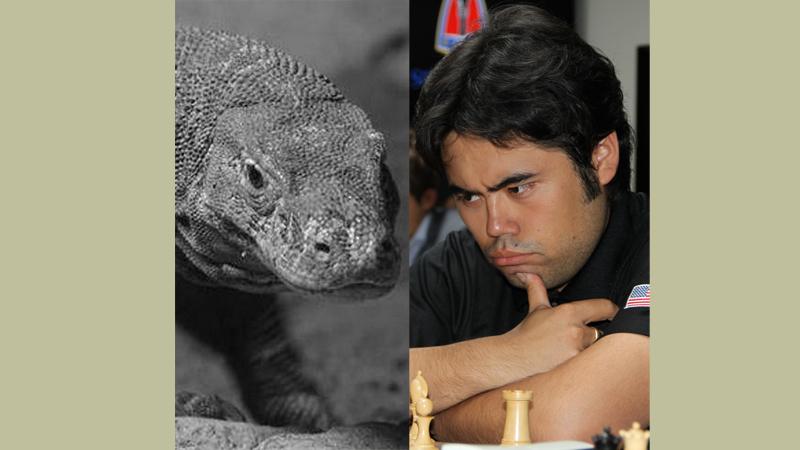
Komodo vs Humanity: Nakamura Will Give It A Go
Komodo, the strongest chess engine, recently faced several grandmasters in odds matches. The next player to represent humanity will be Hikaru Nakamura.
[UPDATE: Chess.com has announced the four-game Komodo-Nakamura match is confirmed for January 6-7, 2016.]
The time that humans could compete on equal terms with computers is long behind us. 1997 is usually taken as the year when machine surpassed man, when Garry Kasparov famously lost his match with IBM's Deep Blue.
The absolute supremacy of the engines came a bit later. In 2002 Vladimir Kramnik tied a match with Deep Fritz 4-4 and a year later Kasparov tied with Deep Junior (3-3) and X3D Fritz (2-2).
The real knockout came in 2005, when Michael Adams lost a match to Hydra 5.5-0.5. A year later Kramnik played one more match with Deep Fritz, but the engine had improved and now won 4-2.
Matches between humans and computers are still being played — just not on equal terms anymore. These days computers play with odds, like the old masters in the 19th century. Especially Paul Morphy was known to play (and win) lots of handicap matches.
In 2007 Rybka, then the strongest engine, defeated Jaan Ehlvest in a pawn-odds match and in another match where the grandmaster was given time, color, opening, and endgame advantages. Roman Dzindzichashvili lost a match when given pawn and move odds.
In September 2008 Vadim Milov narrowly defeated Rybka playing different odds. The Swiss GM won 1.5-0.5 when given pawn-and-move, and 2.5-1.5 when given exchange odds but playing black. In two standard games (Milov as white) Rybka won 1.5-0.5.
Komodo
The strongest chess engine at the moment is Komodo. It won the seventh TCEC competition, the unofficial online world championship for computer chess. Recently, Komodo has played a number of six-game odds matches against humans in Prague.
“Besides recreating the old handicap matches, we try to learn from it as well,” GM Larry Kaufman told Chess.com. After being involved with Rybka, Kaufman is now part of the Komodo team.
“We are testing which odds are good and which aren't. I think we can still have interesting matches between humans and computers.”
Komodo vs Petr Neuman
In the beginning of August, Komodo faced Czech GM Petr Neuman, rated 2464, and born in 1978. Komodo gave two-pawn odds (pawns on c2 and f2 removed) for five games, and one final game at pawn-and-move odds (f7 removed). The time control was 45 minutes plus 15 seconds increment.
Neuman actually managed to win this match convincingly, which got the people behind Komodo to change the odds for future matches. The first game was an interesting draw, and it included an amazing piece sac by the computer (annotations by Komodo itself):
After another draw, Neuman won the next three games as Black. He basically discovered that playing solid chess, and trading some pieces here and there, can be enough to win when you start with two extra pawns! An example:
Having won the match, and knowing what to do handle the situation, Neuman decided to go for something different in the last game. He decided to face Komodo-without-f-pawn, a well-known odds often used by Morphy as well. Neuman was crushed:
Komodo vs Martin Petr
Three weeks later Komodo played another Czech grandmaster: Martin Petr, rated 2515, born 1989. Komodo played all games as White, giving two-pawn odds, but different ones:
- a+b — a draw
- a+d — a draw
- a+e — Komodo won
- a+b again — a draw
- a+d again — Komodo won
- a+e again — Komodo won
Here's the third game. After two draws it's understandable that Petr decided to avoid a move repetition, but the game became an example of how helpess a GM is against a computer in open positions:
“It was very interesting,” Petr told Chess.com. “I was hoping that it could be more close, around even with the handicap, but unfortunately my play was not good enough.”

“I wasn't surprised that the computer played very strongly. I was hoping I could use these two pawns to simplify into the endgame and play some normal chess. But he played very clever. He avoided exchanges, and hardly used time on the clock.”
Komodo vs Sergey Movsesian
The third odds match against a GM was in the second week of September. Komodo faced his strongest opponent so far: Sergey Movsesian, rated 2658, born 1978. Again, the time control was 45 minutes plus 15 seconds increment.
In four games, Komodo played with the same handicap as in his last game against Petr: Black, without the f-pawn. In two games, it played with exchange-odds: Komodo without the a1 rook, Movsesian without the b8 knight. The black rook was placed on b8, so that neither side was able to castle queenside.

writer, programmer and translator living in the Czech Republic.
Movsesian drew two and lost two white games; Komodo drew won and won one white game. The final score was 4.5-1.5 for the engine.
The fourth game game saw an amazing rook sacrifice, which featured as Move of the Week in last week's ChessCenter. Have a look:
“That was nice psychological moment,” Movesian told Chess.com. “At first I couldn't believe it would work. Then I said to myself, wait, this is a machine. This is a problem. This means it works. He has at least a draw.”
Movsesian said that his main motivation to play the match was curiosity. “Especially after Adams-Hydra I wanted to know how much these programs had evolved.”

A curious Movsesian playing Komodo in Prague.
And it wasn't easy. Movesian: “It is very tiring, also mentally, when you can't see the other guy sweat. And playing with pawn odds is very different, not even close to Chess960.
“Almost in every game I had problems with time management. The computer hardly spent time, and some decisions amazed me, made in just a few seconds.”
Next: Komodo vs Hikaru Nakamura
The next opponent for Komodo will be U.S. #1 and world #4 grandmaster Hikaru Nakamura!
Put this in your calendar: the match will be played Jan. 6-7. Four games will be played with the following odds:
- Pawn-and-move odds: Nakamura as White, Komodo as Black, f7 pawn removed, White to move
- Pawn odds: Komodo as White, Nakamura as Black, f2 pawn removed, White to move
- Exchange odds: Komodo as White, Nakamura as Black, a1 rook removed, b8 knight removed, Black rook on b8, White to move
- Four-move head-start odds: Nakamura as White, Komodo as Black, White pawns on e4 and d4, White knight on f3, White to move.
The time control will again be 45 minutes + 15 seconds increment. The match will be covered live on Chess.com/TV.

Last year Nakamura played a four-game match against Stockfish. The American, who was allowed to check his calculations with an old version of Rybka, managed two draws but lost twice, both times pressing instead of acquiescing to a draw.


